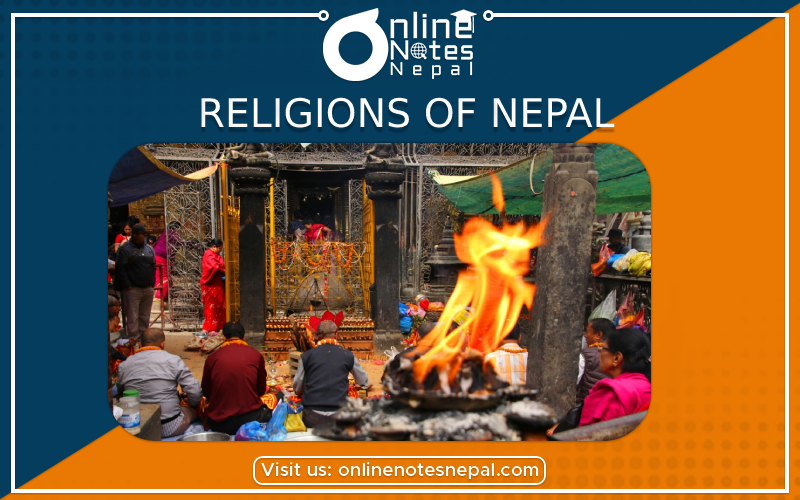Published by: Nuru
Published date: 08 Dec 2021

In this chapter, we discuss about the concepts of different religions prevailed in Nepal. Reference Notes of Social Studies, Grade 8.
The main religions followed in Nepal are Hinduism, Buddhism, Islam, Kirat, and Christianity. As per the census of 2011, 81.3% of the Nepalese population is Hindu, 9.0% is Buddhist 4.4% is Muslim, 3.0% is Kirant/Yumaist, 1.4% is Christian, and 0.9% follows other religions.
Nepal has been declared as a secular state. All religions have been treated equally. No religion is smaller or bigger. The main religions are Hinduism, Buddhism, Islam, and Christianity.There is religious harmony in Nepal.
Hinduism
It is the most followed religion in Nepal and also the oldest religion in the world. This religion is based on the philosophy of the Veda, which is the oldest religious epic of the world. There are four Vedas namely Rig Veda, Sama Veda, Atharva Veda and Yajur Veda. Bhagawat Gita, Mahabharat, and Ramayana are the major holy books of Hindus. Hindus worship different gods and goddesses. The main gods of the Hindus are Brahma, Vishnu, Shiva, and Durga, Laxmi, Saraswati, Hanuman, Ram, Ganesh are the other gods and goddesses worshiped by the Hindus etc.
Buddhism( Buddha)
Buddhism is the second mostly followed religion in Nepal. Buddhism was founded by Gautam Buddha, who was born in Nepal in 563 BC. Even though he was a son of a king, he sacrificed all the comforts and left palace one day in search of a solution to pain and suffering. After he got enlightenment in Gaya, he found out four noble truths.
The four noble truths are:
He found a way to remove the misery by following 'Eight Fold Paths '. They are:
'Tripitak' is considered as the holy book of the Buddhists. 'Jataka Katha', which is also a holy book contains a collection of stories of teachings that Lord Buddha had given to his disciples. 'Tripitak' is the collection of stories about the teachings which Lord Buddha had given to monks, philosopher, and common people.
Islam
Islam was founded by Prophet Mohammed. He was born in Mecca in Arabia in 570 AD. The holy book of the Islam is Quran. They go to the mosque and read Namaz rather than worship idol or statue. The Id is the main festival of Islam. They give donations to the poor people which is called 'Fitra'.
Christianity
Jesus Christ is the founder of Christianity. It is a major religion all over the world. Jesus Christ was kind, simple and religious minded since his childhood. He wanted to free people from injustice and pain. He called God as father and himself as the son of the god. He was very famous among the people. The Jewish and Romans became jealous of him and crucified him.
The holy book of the Christians is the Bible. It contains god's love for living beings and the life and teachings of Jesus Christ.
Sikhism
The Sikh Religion was founded by Guru Nanak during the 15th century. Guru Nanak preached a message of love and understanding and criticized the blind rituals of the Hindus and Muslims. Guru Nanak passed on his enlightened leadership of this new religion to nine successive Gurus.
The Sikh religion today has a following of over 20 million people worldwide. Sikhism preaches a message of devotion and remembrance of God at all times, truthful living, equality of mankind, social justice and denounces superstitions and blind rituals. The Guru Granth Sahib is a collection of the Sikh Gurus' writings that was compiled by the 5th Sikh Guru). It is the fifth-largest organized religion in the world, with approximately 30 million adherents. Punjab of India is the only state in the world with a majority Sikh population.